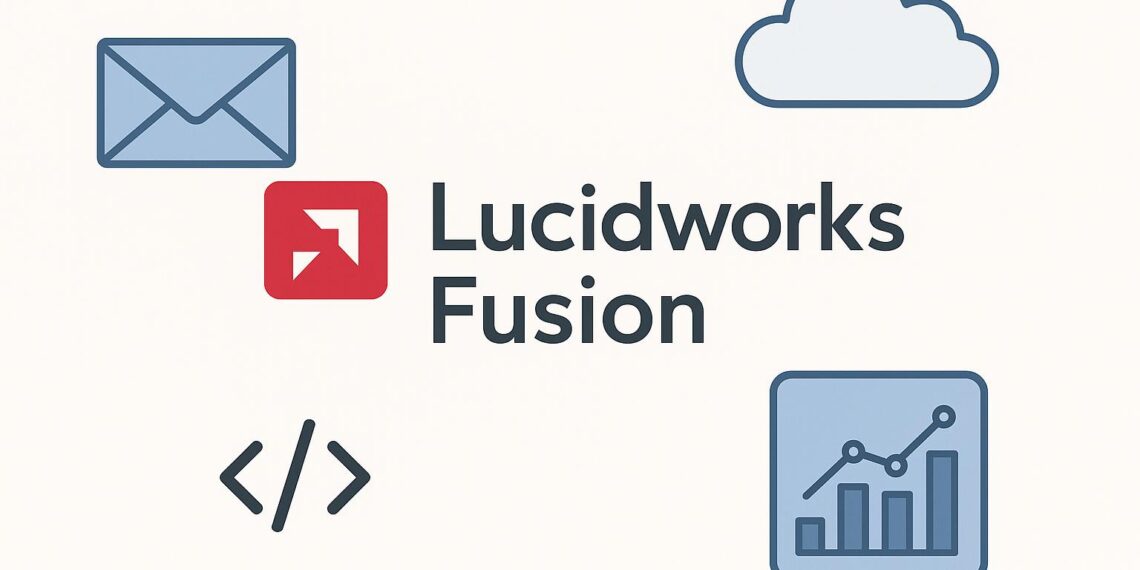Startups dream big, but data chaos is real. You’re moving fast, launching new features, onboarding team members, serving customers—and suddenly, mission-critical info is hiding in five tools, ten drives, or buried in Slack threads. Search is broken, user experience tanked, and even your own team can’t find “the answer.” Now imagine a tool that promises AI-powered, Google-level search—personalized, lightning-fast, and smart enough to “get” what people really mean, not just what they type. That’s what Lucidworks Fusion is pitching to the enterprise world.
But does “AI enterprise search” make sense for startups? In this founder-to-founder guide, we’ll break down exactly what Lucidworks Fusion is, why it matters, where it stuns—and where it stings if your company isn’t ready. Get the real deal on features, limitations, pricing mysteries, and practical checklists. By the end, you’ll know if it’s your next secret weapon or a tool for the “one day” wishlist.
Lucidworks Fusion Overview
At its core, Lucidworks Fusion is like Iron Man’s suit for enterprise search apps: beneath the hood, it’s powered by Apache Solr (battle-tested open source search engine); on top, Fusion adds AI, connectors, dashboards, analytics, and all the enterprise bells and whistles. It’s built for companies drowning in docs, products, tickets, or customer chatter—helping both users and teams surface exactly what matters, faster and smarter. 🔎✨
Lucidworks started as the “go-to” Solr experts and evolved Fusion to let enterprises create search experiences that rival (or even beat) Google and Amazon-style UX—but with your own data, app, or storefront. For a startup with huge ambitions (think: massive catalog, rapid scaling, need for semantic and personalized results), Fusion could hand you tools usually reserved for “the big leagues.” But it’s complex, rich, and definitely overkill for the “keep it simple” crowd. 🧪

Key Features of Lucidworks Fusion
Here’s what stands out for startup founders (and what you’d only get by assembling a small army of engineers yourself):
🤖 AI-Powered Relevance & Personalization Fusion learns customer and team behaviors—clicks, purchases, failed searches—and ranks, boosts, or personalizes results in real time. “Shirts” means organic if history shows you buy organic. Every action is training data.
🔌 Deep Connector Framework Prebuilt integrations for databases, file systems, SaaS apps (like Salesforce, SharePoint, Confluence), plus APIs to crawl just about anything. If data’s living somewhere, Fusion can [probably] index it.
🛠️ Customizable Pipelines (Indexing & Query) Transform, clean, and enrich your data as it’s ingested. Query pipelines let you rewrite, boost, and tune results from code or config. If you need control, Fusion delivers.
💡 Smart Answers & Recommendations Leverage AI and NLP to answer FAQs directly, highlight similar products, or offer “customers also bought…” recommendations. Not just a search box—true digital assistant vibes.
📈 Built-In Analytics and A/B Testing Monitor top searches, failures, audience behaviors, and the ROI of your changes—all out of the box—then iterate and test different ranking or merch rules with real outcome data.
🦾 Flexible Deployment: Cloud, On-Prem, Hybrid Go fully managed in their cloud (let Lucidworks wrangle servers), or deploy in your own VPC or data center for compliance or control—rare in the enterprise AI space.
🔐 Enterprise-Grade Security Fine-grained doc-level permissions, role-based access, integrates with SSO, LDAP, SAML—and ensures compliance when “who can see what” is not negotiable.
👨💻 Dev & Data Science Friendly REST APIs, SDKs, customizable pipelines, and hooks for plugging in your own ML models. If your team lives for config, tuning, and pushing the envelope, Fusion is an open playground.

Lucidworks Fusion Pros and Cons
Let’s keep it startup-real: here’s where Fusion excels (and where it thuds).
👍 Pros
- Top-tier AI Search: Outperforms most DIY or SaaS platforms for complexity, relevance, and learning from behavior.
- Elastic Scaling: Designed to handle “from 100 docs to a billion” without replatforming.
- End-to-End Toolkit: All-in-one for ingest, AI, analytics—no duct-taping tools together.
- Flexible Integration: Connects nearly anywhere your data lives.
- Security and Compliance Ready: Built for industries where privacy is non-negotiable.
👎 Cons
- Steep Learning Curve: Not plug-and-play; deep search/AI and DevOps skills required to leverage full power.
- Enterprise Pricing: No sticker price, big commitments, and usually too pricey for most early-stage startups.
- Complex Setup: Expect weeks (for “hello world” search) and months (for full AI/ML-powered relevancy).
- Heavy for Simple Use Cases: If you just need basic site, app, or support search, there are easier, cheaper options.
- Opaque Trials/Discounts: No self-service free tier or startup credits advertised; sales-rep time mandatory.
Considering for Startups
Before you send that “Contact Sales” email, sanity check your startup against these factors:
💰 Is enterprise spend realistic?
Can you afford $tens of thousands+ per year in licensing plus onboarding? Be honest—Fusion is a major investment.
👥 Do you have (or can you hire) search, Solr, or ML expertise?
Fusion’s superpowers shine with skilled engineers and data science know-how—otherwise you’ll underutilize 90% of it.
📊 Is “world-class search” core to your product value?
If intelligent discovery, recommendations, or lightning-fast, intent-aware retrieval is mission critical—not just “nice to have”—Fusion’s ROI math changes.
📈 Are you scaling fast with exploding data and queries?
Fusion is built for teams running into (or fearing) the limits of basic SaaS or homegrown search. If you’re dealing with big growth or friction, it could save a replatforming nightmare later.
🔗 Do you need deep data integrations or fancy AI right now?
Does your business require unifying a mess of sources (apps, docs, APIs) or AI-powered results—from day one? Fusion’s connector and ML suite can be a differentiator.
🕱️ Can you wait for value?
Budget in months, not days, for proper setup, collecting signals, and tuning AI features. If you need “good enough” today for an MVP, Fusion is usually overkill.
🧹 Do you need self-hosted or strict compliance?
Some startups (especially in fintech/health) need to run search on their own infrastructure; Fusion gives you options, unlike many SaaS competitors.
🥇 Are you aiming to be a data leader in your market?
If search, discovery, or AI is the “special sauce” that makes you beat bigger incumbents, Fusion is worth a hard look.
Lucidworks Fusion Plans and Pricing
Transparency alert: Lucidworks Fusion pricing is never public, and always custom. Here’s a founder-friendly table based on industry patterns and public sources:
| Plan | Monthly Price (Annually Billed) | Usage Limit | Key Features |
|---|---|---|---|
| Developer/Sandbox | $0–Negotiated, invite-only | Evaluation/sandbox use | Limited features, demo data or trial, sales approval |
| Fusion Cloud | Custom quote (est. $3,000–$10,000+/mo) | Scales with usage | Managed hosting, AI features, connectors, analytics |
| Self-Managed | Custom quote (est. $30,000+/year) | Unlimited (infra-limited) | Full platform, on-prem/cloud deployment, all features |
| Enterprise Plus | Custom, highest | Unlimited, 24/7 support | Enterprise SLAs, dedicated support, all connectors |
- No public free tier. You must talk to sales and may get access to a trial or demo environment if you qualify.
- Watch out for add-on costs: Advanced connectors, support tiers, professional services, and custom AI models may all add to the quote.
- No monthly billing for real deployments: Plans are typically annual or multi-year.
Lucidworks Fusion Startup Discount or Promo Info 🚫 No advertised startup discounts, promo codes, or usage credits. Fusion operates on an enterprise sales model. If you’re a high-growth, high-visibility startup, you might negotiate lower pricing, a pilot, or phased rollout with the sales team—but don’t bank on it.
✨ What founders can ask for:
- A proof-of-concept sandbox or limited trial (approval required).
- Custom “ramp up” or “startup friendly” contract—rare, but worth the conversation if you’re a flagship opportunity.
- Ask if your accelerator or cloud provider has any partnership; these are uncommon in this category, but still worth checking.
Comparing Lucidworks Fusion with Alternatives
Fusion isn’t the only way to boost search for your startup. Here’s how it stacks up against two founder favorites: Algolia (for simple/stylish SaaS search) and Elastic Enterprise Search (powerful, scaling open source + cloud).
| 🥉 Feature | Lucidworks Fusion | Algolia | Elastic Enterprise Search |
| 🏱 Free tier | Trial by invite; none public | Yes (limited records/ops) | Yes (workplace/app search, basic tier) |
| 🤖 AI/ML Relevance | Advanced (personalization, LTR, recommendations) | Good, easier auto-tuning | Some ML (basic relevance tuning, less AI) |
| 🔌 API Access | Yes; full REST API, SDK | Excellent; API-first, dev docs | Full REST API, open source, Elastic SDK |
| 🌍 Connectors | Dozens, enterprise focus | Webhook/imports, some partners | Many built-in (SaaS, cloud, dbs) |
| ⚖️ Scalability | Extreme, up to petabytes | Excellent for most SaaS use | Very high, huge Elastic community |
| 🏷️ Pricing | Custom, high, annual | Usage-based, transparent, startup plans | Cloud, resource-based, open source available |
| 🎯 Best for | Massive data/AI, regulated, custom | Startups needing stylish, blazing-fast search | Dev teams, open source, hybrid deployments |
FAQs
❓ Is Lucidworks Fusion beginner-friendly?
Not really. Fusion is designed for teams with search/ML/infra background; founders need technical firepower to unlock its value.
❓ What are the hidden costs?
Professional services, premium connectors, advanced AI features, and higher support can significantly add to the quote. Infrastructure for self-managed is also your burden.
❓ Can I try Lucidworks Fusion for free?
There’s no public free plan. Some startups may get limited-time pilots or sandbox access via sales teams, especially with a strong opportunity or high growth.
❓ Is it SaaS, on-prem, or both?
Both! Fusion Cloud is fully managed; self-managed can run on your cloud or data center. This is a big differentiator vs. SaaS-only search like Algolia.
❓ Does it integrate with (insert my software stack)?
Fusion has prebuilt connectors for many enterprise systems, and an extensible API for building your own. Usual suspects (Salesforce, SharePoint, file storage, major DBs) are covered.
❓ How long does setup take?
Weeks for basic search if experienced; months for deep AI features (which require data collection and tuning). Plan for a real onboarding project.
❓ Is it just for e-commerce?
Nope—Fusion shines in any use case with huge, complex search demands: marketplaces, knowledge bases, support, SaaS discovery, regulated data, and beyond.
❓ Is there good support and docs?
Official documentation is strong for mainline features. For advanced tuning, you may need to rely on Lucidworks support or hire expertise.
Final Thoughts
So, does Lucidworks Fusion make sense for your startup? Here’s the unfiltered founder truth:
- ⚡ If you’re a tiny team, pre-seed, building an MVP, or just need “good enough” search—Fusion is (way) too much. Don’t sweat it. Stick with Algolia, Elastic, or similar until you justify the leap.
- 🦄 If you’re in warp-speed scale mode (Series A/B+), and search or product discovery is your secret weapon (think: the next Rubrik, Databricks, Notion, or mega-marketplace), and you’ve got the budget and the brains—Fusion can give you AI search muscle that few startups wield.
- 💡 The middle ground: Reach out for a conversation if you think you’re on the edge. Best case, you find a partner for scaling search; worst case, you learn what “enterprise” really means for your own roadmap.
Still not sure? Experiment with open-source Solr (or Elasticsearch), and level up as you grow. Search is only a bottleneck when it’s stopping success—until then, build, learn, and hack smarter. 💪🚀
Got more questions? Ping an enterprise search expert or startup mentor. The most scalable answers usually come from the ones you already trust.










